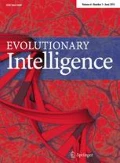Further research into intelligence of machinery will probably be very greatly concerned with ‘searches’ …. They might very briefly be defined as ‘searches carried out by brains for combinations with particular properties’ … There is the genetical or evolutionary search by which a combination of genes is looked for, the criterion being survival value… The remaining form of search is what I should like to call the ‘cultural search’.
Alan Turing, Intelligent Machinery 1948
Search mechanisms of a wide variety were identified as a cornerstone of Artificial Intelligence (A.I.) at the field’s beginnings. Since then the use of population-based search techniques to create A.I. has grown exponentially, alongside their use for optimisation problems and other tasks. The first issue of this journal contained four invited overview papers of the topics I perceived to be its principle domain: three considered genetics-inspired search to design the widely adopted knowledge representations of fuzzy logic, neural networks and rule-based systems; and a fourth, which considered immune system-inspired search and representations. During the journal’s brief lifetime (and before) numerous other population-based search techniques and knowledge representations have continued to emerge and prove useful. The purpose of this special issue is to highlight just some of those new areas. Two of the invited papers consider search techniques and two consider knowledge representations. I hope they will inspire. And my sincere thanks to the authors for their efforts on behalf of the journal.
Author information
Authors and Affiliations
Corresponding author
Rights and permissions
About this article
Cite this article
Bull, L. Foreword. Evol. Intel. 7, 1 (2014). https://doi.org/10.1007/s12065-014-0107-5
Published:
Issue Date:
DOI: https://doi.org/10.1007/s12065-014-0107-5

